The faculty of the Master's Degree in Spanish Literature and Literary Studies in Relation to the Arts, given the multidisciplinary nature of the degree, belongs to five departments of the Faculty of Philosophy and Letters:
- Department of Spanish Literature and Theory of Literature and Comparative Literature.
— From the area of Literary Theory and Comparative Literature: Alfonso Martín Jiménez, Sara Molpeceres Arnáiz y Javier Alonso Prieto.
— From the area of Spanish Literature: Teresa Gómez Trueba, Patricia Marín Cepeda, Javier J. Jacobo González, María Martínez Deyros, Cristina Ruiz Urbón e Irene González Escudero.
- Department of Art History: Javier Castán Lanaspa.
- Department of Philosophy: Adrián Pradier.
- Department of Prehistory, Archaeology, Social Anthropology and Historiographic Sciences and Techniques: Mª Pilar Panero García e Irene Ruiz Albi.
- Departmental section of History and Science of Music, belonging to the Department of Didactics of Musical, Plastic and Corporal Expression: Carlos Gutiérrez Cajaraville.
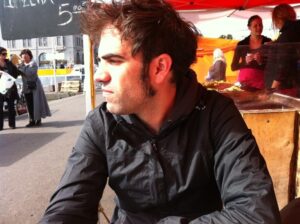
Javier Alonso Prieto is a Margarita Salas postdoctoral researcher and professor of Literary Theory and Comparative Literature. He has worked as a high school philosophy teacher. His doctoral thesis received the Excellence Award from the Equality Commission of the University of Valladolid (2021).
He has done research stays at the Freie Universität Berlin, at the Université Paris-Sorbonne, at the University of Oviedo, at the Università Roma Tor Vergata, at the Universitá di Bologna and at the CSIC.
He has been writing literary criticism since 2007 and in 2013 was selected as a Spanish critic to participate in the project “Slovene literature and foreign critics”. He has co-edited A constructivist rhetoric. Creación y análisis del discurso social (Universitat Jaume I, 2022) and in 2024 he will publish the essay La construcción retórica de La Pastora, un maquis intersexual y trans (Bellaterra).
He participates in the research project “Fractales: Estrategias para la fragmentación en la narrativa española del siglo XXI”. Together with Professor Loreta Frattale (U. Roma Tor Vergata) she coordinates the Permanent Research Seminar “Bios y poiesis. Genesis and genealogy of a fractal aesthetic”.
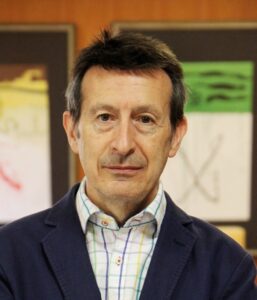
Javier Castán Lanaspa holds a PhD in Art History and is a professor of History of Ancient and Medieval Art in the Department of Art History at the University of Valladolid.
Director of the Chair of History and Aesthetics of Cinematography at the University of Valladolid.
Elected member of the Fine Arts Academy of Valladolid.
His lines of research and publications are directed to Spanish Medieval Art, Artistic and Cultural Heritage of Valladolid and Castilla y León (cataloging, study and protection), History and Aesthetics of Cinema.
As a teacher he is in charge of subjects related to Ancient Western and Near Eastern Art, and Spanish Medieval Art. Also the language and aesthetics of cinema, within the curriculum of the Degree in Art History at the University of Valladolid.
He is Director of the Postgraduate Course on History and Aesthetics of Cinema at the University of Valladolid.
Coordinator of the Bachelor of Research and Excellence in Arts, University of Valladolid.
Programador de actividades culturales y cursos de introducción al cine, comisario de exposiciones, jurado en certámenes de artes plásticas y cinematográficas.
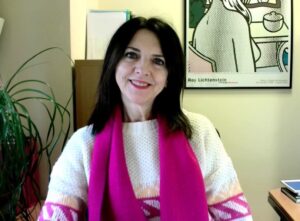
Teresa Gómez Trueba is Professor of Spanish Literature at the University of Valladolid. For years she devoted herself to the study and edition of the Obra poética de Juan Ramón Jiménez (Espasa Calpe, 2005, 4 ts.). In relation to her studies of the Modernism period, she also published the book Cómo se hace una novela de Miguel de Unamuno (Cátedra, 2009). She is also the author of the essay El sueño literario en España (Cátedra, 1999).
In recent years she has worked mainly on the latest Spanish narrative, focusing on phenomena such as metafiction, generic hybridism, intermediality, microtextuality, fragmentarism or literature and new technologies, issues on which she has written numerous articles in specialized journals and collective volumes.
She is co-author of the monograph Hologramas: realidad y relato del siglo XXI (Trea, 2017) and editor of the anthology Mire a cámara, por favor. Antología de relatos sobre tecnología y simulacros (Universidad de Zaragoza, 2020). Among many others, she has edited collective volumes such as Página y pantalla: interferencias metaficcionales (Trea, 2019), Extranjeros, turistas, migrantes. Estudios sobre identidad y alteridad en las culturas hispánicas contemporáneas (Iberoamericana-Vervuert, 2021) o Grietas: estudios sobre fragmentarismo y narrativa contemporánea (Peter Lang, 2022). She has just published the monograph Espectáculo apocalipsis: la estetización de la distopía en la narrativa española del siglo XXI (Visor, 2023).
She is currently the director, together with Carmen Morán Rodríguez, of the R+D+i Research Project: “Fractales: estrategias para la fragmentación en la narrativa española del siglo XXI” and co-directs the literary collection “Fractales” of the publications service of the University of Valladolid.
A complete list of her publications can be found at https://uva-es.academia.edu/TeresaG%C3%B3mezTrueba.
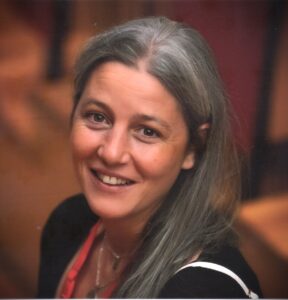 Irene G. Escudero es filóloga e investigadora, especializada en teatro del Siglo de Oro. Se graduó en Filología por la Universidad de Valladolid en 2016 y obtuvo un Máster en Estudios Filológicos Superiores en la misma universidad. En 2021 defendió su tesis doctoral y, desde entonces, cuenta con un contrato Margarita Salas durante el cual ha realizado una estancia de tres años en el Instituto Almagro de Teatro Clásico, dependiente de la Universidad de Castilla‑La Mancha, donde trabajó en la investigación sobre las obras en colaboración de Rojas Zorrilla, gracias a un proyecto I+D+i. Actualmente, continúa con el mismo contrato en la Universidad de Valladolid estudiando el nuevo repertorio atribuido a Andrés de Claramonte. Además, tiene varias publicaciones, es miembro del GIR de Literatura y Teoría Literaria en la España de los Siglos de Oro, ha pertenecido a comités organizadores de varios congresos y jornadas, y es coordinadora de los equipos de redacción de boletines de espectáculos en el Festival Olmedo Clásico y en el Festival Internacional de Teatro Clásico de Almagro.
Irene G. Escudero es filóloga e investigadora, especializada en teatro del Siglo de Oro. Se graduó en Filología por la Universidad de Valladolid en 2016 y obtuvo un Máster en Estudios Filológicos Superiores en la misma universidad. En 2021 defendió su tesis doctoral y, desde entonces, cuenta con un contrato Margarita Salas durante el cual ha realizado una estancia de tres años en el Instituto Almagro de Teatro Clásico, dependiente de la Universidad de Castilla‑La Mancha, donde trabajó en la investigación sobre las obras en colaboración de Rojas Zorrilla, gracias a un proyecto I+D+i. Actualmente, continúa con el mismo contrato en la Universidad de Valladolid estudiando el nuevo repertorio atribuido a Andrés de Claramonte. Además, tiene varias publicaciones, es miembro del GIR de Literatura y Teoría Literaria en la España de los Siglos de Oro, ha pertenecido a comités organizadores de varios congresos y jornadas, y es coordinadora de los equipos de redacción de boletines de espectáculos en el Festival Olmedo Clásico y en el Festival Internacional de Teatro Clásico de Almagro.

Javier J. González Martínez is full professor in the Department of Spanish Literature and Theory of Literature and Comparative Literature at the University of Valladolid.
He has participated as a researcher in several projects of the state R&D plan funded by the Ministry of Science and Technology. He is a member of, among other research groups, the Group in Applied Digital Humanities of UNIR, the Seminar of Theater Studies of UCM and is a member of ITEM (Theater Institute of Madrid of the Complutense University). He has two six-years period of research.
He has been visiting professor at the Eötvös Loránd University of Budapest and the Marie Curie-Sklodowska University of Lublin. He has also taught and researched at the Escuela Superior de Arte Dramático de Castilla y León and at the Universidad Internacional de La Rioja. Some of the studies in which she currently teaches are the degree in Spanish: Language and Literature (UVa), the master's degree in Spanish Literature and Literary Studies in Relation to the Arts (UVa), the doctoral programs in Humanities and Digital Society (UNIR), in Theatre Studies (UCM) and in Spanish: Linguistics, Literature and Communication (UVa).
His main lines of research are the Spanish theater of the Golden Age, methodology, theory and theater criticism.
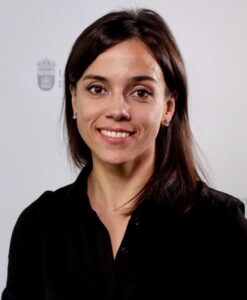
Patricia Marín Cepeda is Associate Professor in the area of Spanish Literature at the University of Valladolid. Since 20005, her predoctoral and postdoctoral career has been developed in various national and foreign research centers, thanks to obtaining research programs, such as the FPU Grant (2005-2009, Ministry of Education), Postdoctoral Mobility Grant (2011-2013, Ministry of Education), and Postdoctoral Program Beatriú de Pinós- Marie Curie Fellowship (2014-2015), among others. She has completed short research and training stays at the Graduate Center of CUNY (New York), Università di Firenze (Florence), University of Cincinnati (Ohio), Syracuse University (Syracuse, New York) and Università di Roma Tre (Rome). From 2011 to 2021, she has been a contract lecturer and researcher at Pompeu Fabra University, University of Jaén and University of Burgos.
She holds a degree in Hispanic Philology (2005, Extraordinary Undergraduate Award) and a PhD in Hispanic Philology (2011, Extraordinary Doctorate Award and European Mention) from the University of Valladolid. She has three research periods recognized by the National Agency for Evaluation and Accreditation (ANECA, sexenios: 2005-2010; 2011-2016; 2017-2022) and two teaching periods (quinquenios).
She has participated in eight funded research projects, national, regional and European. She has directed her own project (2018-2020) within the BBVA Foundation Leonardo Scholarship program. Currently, she is a member of the European ERC project (2021-2026) directed by Warren Boutcher (University of London - Queen Mary), “Textuality and Diversity: a Literary History of Europe and its Global Connections, 1545-1659” (TextDiveGlobal), and of the regional project (Junta de Andalucía, 2023-2025) directed by Cristina Moya García, “Literatura y reginalidad en la España de los siglos XVI y XVII: las mujeres de la casa de Austria” (Literature and reginality in sixteenth- and seventeenth-century Spain: the women of the house of Austria).
In the field of Golden Age studies, she is the author of nearly fifty academic publications in international scientific journals and publishing houses, and is currently directing several doctoral theses in this field. She has been a speaker and lecturer at numerous national and international conferences and seminars (France, Italy, Portugal, United States, Canada, Mexico, Switzerland, Denmark, Croatia). She has a strong interest in psychoanalytic theory and praxis of Lacanian orientation, a field in which she receives continuous clinical and epistemic training at the Institute of the Freudian Field (ICF - Nucep, Clinical Section of Madrid). She collaborates as an associate member of the Réseau Universitaire Européen de Psychanalyse (RUE).
She is currently academic coordinator of the Master in Spanish Literature and literary studies in relation to the arts.
A partial list of her publications can be found at the following link.
The general lines of research in which she is currently working are:
— History and culture of the Golden Age.
— Study and philological edition of prose and poetry texts of the Golden Age.
— Eroticism and literature in the Golden Age.
— Feminine writing in the Golden Age.
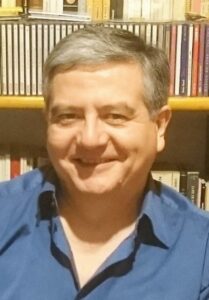
Alfonso Martín Jiménez holds a degree in Hispanic Philology (Extraordinary Degree Award) and a PhD in Philosophy and Letters from the University of Valladolid (Spain). After finishing his university degree, he obtained scholarships to continue his education abroad for two academic years, and studied Literary Theory at the Universidade do Minho (Braga, Portugal) and Rhetoric, Literary Theory and the work of Cervantes at the Collège de France, at the École de Hautes Études en Sciences Sociales and at the Sorbonne Université (Paris, France). He has been Professor of Literary Theory at the University of La Coruña, at the University of Santiago de Compostela and at the University of Valladolid, where he is currently Professor of Literary Theory and Comparative Literature.
His main lines of research are related to the Theory of Literature, Literary Criticism, Rhetoric and Comparative Literature, and focus on the analysis of temporality in literary texts; the poetics of imagination; the relationship between rhetoric and literature; the theory of literary genres and fictionality; the rupture of fictional logic (fictional metalepsis) and the analysis of the relationships of imitation, intertextuality and hypertextuality between the works of several Spanish authors of the Golden Age, such as Cervantes, Lope de Vega, Mateo Alemán, Mateo Luján de Sayavedra, Jerónimo de Pasamonte, Avellaneda or Quevedo.
He has published in Spain and other countries about a hundred papers related to these lines of research, which have been cited and commented on nationally and internationally by a large number of authors.
He has participated in eight funded research projects. He has obtained five research periods (sexenios), one knowledge transfer and innovation period (sexenios) and five teaching periods (quinquenios). He has regularly attended a large number of seminars and training workshops for university professors, and his teaching work has been rated as “excellent” by the Program for the Evaluation of the Teaching Activity of the Teaching Staff of the University of Valladolid.
Since 2009 he is co-director of the digital journal Castilla. Estudios de Literatura. In 2014, the journal obtained the “Sello de Calidad de Revistas Científicas Española”, granted by the Spanish Foundation for Science and Technology (FECYT), which was renewed in 2018, 2020, 2021, 2022 and 2023. Likewise, the journal is indexed in recognized national and international databases and repositories.
Since 2016 he is Director of Ediciones Universidad de Valladolid (EdUVa), and has been in charge of promoting the creation of the Portal de revistas digitales en acceso abierto de la Universidad de Valladolid, a new Reglamento de Ediciones Universidad de Valladolid or the Guía de buenas prácticas de Ediciones Universidad de Valladolid.
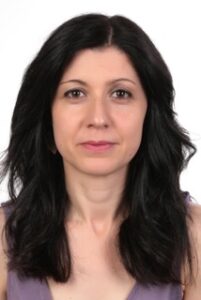
María Martínez Deyros is Full Professor of Spanish Literature in the Department of Spanish Literature and Theory of Literature and Comparative Literature at UVa. As for her training, she holds a degree in Hispanic Philology (2009) and a PhD from the University of Valladolid (September 2017). Her doctoral thesis, entitled Propuesta metodológica para el estudio y la edición de manuscritos y textos hispánicos: la crítica genética y los borradores de poesía de Miguel de Unamuno (Outstanding Cum laude with International Mention), was funded by a research grant (FPI-Uva) awarded by the University of Valladolid and Banco Santander. The results of this research were published in several scientific articles (8) in prestigious journals such as RILCE, Revista de Literatura, Ínsula or Artifara.
Her lines of research are mainly focused on Hispanic Literature of the twentieth and twenty-first centuries. Her studies have focused, on the one hand, on the figure and poetic work of Miguel de Unamuno; and, on the other hand, on the Hispanic short narrative, one of the lines of work of the research group to which she belongs as an associate member, GIRLEC (Recognized Research Group of Contemporary Spanish Literature) of the University of Valladolid. Within the aforementioned GIR, she participates as a member of the Working Team in the project funded by MINECO, “La narrativa breve española actual: estudio y aplicaciones didácticas” (FFI2015-70094-P).
She has collaborated with the Consolidated Research Unit of Castilla y León, Spanish Literature and Digital Humanities, as co-director of several research contracts funded in competitive concurrence by the Junta de Castilla y León and oriented to the digital edition of several adapted classical works of Spanish literature.
She is currently the academic coordinator of the specialty of “Spanish Language and Literature” in the “Master of Teacher of Compulsory Secondary Education and Baccalaureate, Vocational Training and Language Teaching” at the University of Valladolid.
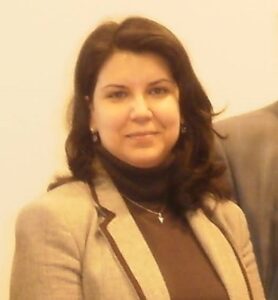
Sara Molpereces Arnáiz is a full university professor in the area of Literary Theory and Comparative Literature. She graduated in English Philology in 2001 from the University of Valladolid and graduated in Literary Theory and Comparative Literature in 2002. She obtained her PhD with distinction cum laude at the same University in 2010, obtaining the Extraordinary Doctorate Award.
All her research has been developed in the area of Literary Theory and Comparative Literature. Her lines of research include Comparative Literature (particularly updates of myths in literature and art, and lately myths on the construction of female identity), Rhetoric applied to current discourses (literary and non-literary) and, from Literary Theory, the study of aesthetic categories such as the fantastic, the Freudian sinister or the sublime.
This research has materialized in numerous publications, including the monographs Pensar en imágenes. Los conceptos de mito, razón y símbolo a lo largo de la cultura occidental (Universidad de Murcia, 2013) y Mito persuasivo y mito literario. Coordenadas para un análisis retórico-mítico de los discursos (Universidad de Valladolid, 2014). His contributions also include several book chapters, several of them published in top international publishers (Routledge, 2021; John Benjamins, 2020 and 2017), top national publishers (Trea 2019; Gedisa, 2018; Tecnos, 2018; Dykinson, 2017; Biblioteca Nueva, 2014) and university publishers (Universidad de Alcalá, 2016; Universidad de Salamanca, 2014; Universidad CEU San Pablo, 2014 and 2013, Universidad de Murcia, 2012; Universidad de Alicante, 2012; Universidad de Cádiz, 2006). He also has several publications in indexed journals and several in journals in the first and second quartiles of Scopus and other analogous indexes (Gazeta de Antropología, 2022; El futuro del pasado, 2022; Tonos Digital, 2020 y 2012; Cultura, Lenguaje y Representación, 2017; Opción, 2016; Studi Ispanici, 2015; Historia y Comunicación Social, 2014 y 2013; Monteagudo, 2013; Oralia, 2009; etc.).
She has participated as a member of the research team in different research projects funded by the Spanish Ministry (the CEI and CEI2 projects, RECDID and CODISCO), all of them focused on the rhetorical analysis of current artistic and social discourses.
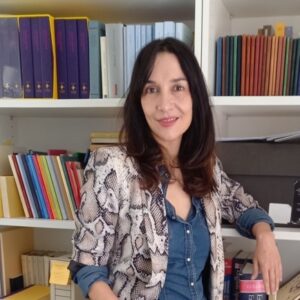
Carmen Morán Rodríguez has been a teacher and researcher at the universities of the Balearic Islands and Jaén, and is currently Professor of Spanish Literature at the University of Valladolid.
She has carried out research stays at the Graduate Center of The City University of New York, the University of Lisbon, the University of Buenos Aires, the University of Puerto Rico (Río Piedras), among others. She has been part of prestigious research programs, such as the Fulbright, Juan de la Cierva and Ramón y Cajal programs.
She is the author of three monographs published in prestigious publishing houses: Figuras y figuraciones femeninas en la obra narrativa de Rosa Chacel (CEDMA, 2008), Juan Ramón Jiménez y la poesía argentina y uruguaya en el año 48. Historia de una antología nunca publicada (Visor), Hologramas, realidad y relato del siglo XXI (TREA, en colaboración con Teresa Gómez Trueba). They have received numerous reviews in media such as Rilce, Prosemas, El País (Uruguay), Pasavento, etcetera.
Dr. Morán Rodríguez's articles have appeared in journals well positioned in SJR and other indexing databases, such as Rilce, Cuadernos Hispanoamericanos, Ínsula, Cuadernos de Literatura, Tonos digital, Amaltea, Oceánide, Ogigia, Pasavento, Letral, Caracteres, Archivum, Artifara o Cincinnati Romance Review, among others. She is the author of numerous book chapters published by publishers such as Peter Lang, Biblioteca Nueva, Visor, Iberoamericana-Vervuert, Renacimiento, and of critical editions published by Espasa, Iberoamericana/Vervuert and Biblioteca Castro.
She has also supervised six doctoral theses between 2014 and 2023, all of which were graded Cum Laude. Two have been Extraordinary Prize, two of them had mention of internationalization, and one more was defended in a foreign university (Université d'Alger) and obtained the mention of internationalization. She is currently directing three more theses in the PhD Program at the University of Valladolid.
She has participated as a speaker and lecturer in more than 50 national and international congresses, and has been part of the organizing and scientific committee of 20 others. He has curated two national research projects.
Her research interests are focused on the survival of traditional culture in the mass media and the processes of masking in literary, audiovisual and intermedial discourse.
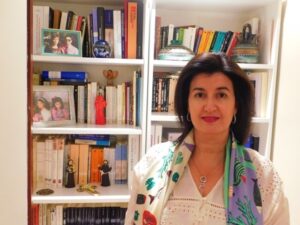
M.ª Pilar Panero García is a Professor of Social Anthropology at the University of Valladolid. She holds a PhD in Anthropology from the University of Valladolid, a degree in Hispanic Philology from the University of Salamanca and a degree in Literary Theory and Comparative Literature from the University of Valladolid.
Since November 2022 she has been director of the Chair of Studies on Tradition. Member of the GIR Identity and artistic exchanges. From the Middle Ages to the Contemporary World (IDINTAR).
Between 2009 and 2020 she has been a member of the “Centro Internacional de Estudios de Religiosidad Popular: La Semana Santa” as a researcher with management tasks. She has worked in the diffusion of the cultural values of the Holy Week of Valladolid through exhibitions, in which she makes known art, rites, music in other places where the celebration is lived with intensity. They have been carried out in Rome, Oporto, Paris, Santa Fe and Albuquerque, Mansilla de las Mulas, Valladolid, different places of Puglia and Palermo.
She has enjoyed grants to carry out various anthropological works and has been a member of the teams in several research projects, such as the Masquerades of the territory of La Raya between Trás-os-Montes and Zamora and Salamanca (2019) participating in the drafting of the proposal for the UNESCO candidacy.
She is currently part of the team of the projects: since 2020 The Interpretation of Childbirth in Early Modern Spain of the Institut für Romanistik (Universität Wien); and since 2022 in “El corpus de la narrativa oral en la cuenca occidental del Mediterráneo: estudio comparativo y edición digital (CONOCOM)” (Universidad de Jaén). She is PI of the project Unveiling the Arts and Works behind the MASKS (Project acronym: MASKS) of the ERASMUS-EDU-2023-PI-ALL-INNO-EDU-ENTERP ─ Alliances for Education and Enterprises program.
She combines her teaching duties in the Department of Prehistory, Archaeology, Social Anthropology and Historiographic Sciences and T.C. at the University of Barcelona. Historiográficas of the University of Valladolid with the publication of several scientific articles in national and foreign journals, book chapters, coordinating books and monographs in journals and participating in courses, seminars and national and international conferences. She also teaches in the University of the Experience “Millán Santos”, collaborates in some publications and various outreach activities such as exhibitions, radio and television programs and university extension forums.
She is the director of the R.U. Alfonso VIII (UVa) since October 2022.
Her lines of research are cultural heritage, popular religiosity, ethnohistory and literature from cultural anthropology whose main work has been her thesis on the chronicle of the Indies of Fray Toribio “Motolinía”. She is currently focused on the aesthetic journeys of ethnographic heritage.

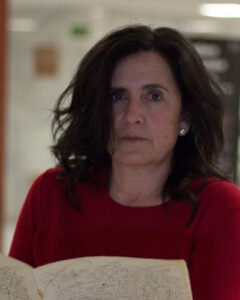 Irene Ruiz Albi. Uno de los pilares de mi carrera científica es la edición y estudio de fuentes manuscritas, tanto documentales como librarias. Mi tesis doctoral versó sobre la cancillería de la reina doña Urraca, tema que retomé años más tarde para estudiar la cancillería de Urraca, siendo infanta, junto a su marido, Raimundo de Borgoña. Otras fuentes documentales medievales editadas y estudiadas han sido colecciones documentales de los monasterios de San Román de Entrepeñas, San Pedro de Eslonza y Santa María de Valpuesta. En la actualidad estoy trabajando, junto a mis compañeros de área, en el fondo medieval del monasterio de las Huelgas de Valladolid. Del periodo medieval, es también mi participación en el estudio, edición y transcripción de la Historia Roderici, el Fuero de Béjar, y más recientemente en una nueva edición de las famosas Glosas Silenses. Con relación a fuentes de la Edad Moderna colaboré en la edición de 25 volúmenes con las Actas de las Juntas Generales de Álava de los siglos XVI y XVII, en varios Corpus documentales como el del Tratado de Tordesillas o el relacionado con la Primera Vuelta al mundo. En 2010 publiqué un Catálogo con unos 4.000 documentos de Luxemburgo conservados en el Archivo General de Simancas, fue fruto del trabajo realizado durante más de dos años en los que disfruté de una beca del Instituto de Historia Simancas. En los últimos años he enfocado mi carrera investigadora a la edición y estudio de documentos relacionados con el mundo mercantil, dando como resultado varias publicaciones. He realizado algunas investigaciones en el campo paleográfico, de períodos muy distantes, como son el visigótico y el humanístico.
Irene Ruiz Albi. Uno de los pilares de mi carrera científica es la edición y estudio de fuentes manuscritas, tanto documentales como librarias. Mi tesis doctoral versó sobre la cancillería de la reina doña Urraca, tema que retomé años más tarde para estudiar la cancillería de Urraca, siendo infanta, junto a su marido, Raimundo de Borgoña. Otras fuentes documentales medievales editadas y estudiadas han sido colecciones documentales de los monasterios de San Román de Entrepeñas, San Pedro de Eslonza y Santa María de Valpuesta. En la actualidad estoy trabajando, junto a mis compañeros de área, en el fondo medieval del monasterio de las Huelgas de Valladolid. Del periodo medieval, es también mi participación en el estudio, edición y transcripción de la Historia Roderici, el Fuero de Béjar, y más recientemente en una nueva edición de las famosas Glosas Silenses. Con relación a fuentes de la Edad Moderna colaboré en la edición de 25 volúmenes con las Actas de las Juntas Generales de Álava de los siglos XVI y XVII, en varios Corpus documentales como el del Tratado de Tordesillas o el relacionado con la Primera Vuelta al mundo. En 2010 publiqué un Catálogo con unos 4.000 documentos de Luxemburgo conservados en el Archivo General de Simancas, fue fruto del trabajo realizado durante más de dos años en los que disfruté de una beca del Instituto de Historia Simancas. En los últimos años he enfocado mi carrera investigadora a la edición y estudio de documentos relacionados con el mundo mercantil, dando como resultado varias publicaciones. He realizado algunas investigaciones en el campo paleográfico, de períodos muy distantes, como son el visigótico y el humanístico.
Publicaciones más relevantes:
- Irene Ruiz Albi, La reina doña Urraca (1109-1126). Cancillería y colección diplomática, León, 2003.
- José Manuel Ruiz Asencio, Irene Ruiz Albi, Mauricio Herrero Jiménez, Los Becerros Gótico y Galicano de Valpuesta, Salamanca, 2010.
- Irene Ruiz Albi, Documentos de Luxemburgo en el Archivo de Simancas (siglo XVI-XVII), Madrid, 2014.
- David Carvajal de la Vega, Mauricio Herrero Jiménez, Francisco J. Molina de la Torre, Irene Ruiz Albi, Mercaderes y cambiadores en los protocolos notariales de la provincia de Valladolid (1486-1520), Valladolid, 2015.
Dirección de tesis doctorales en los últimos 10 años:
- Año 2015. Ane Elixabet Galindo Azkunaga, Libros expurgados de la Biblioteca Histórica de Santa Cruz de Valladolid.
- Año 2016. Víctor Arenzana Antoñanzas, Los libros de Actas del concejo de Valladolid (1497-1520)
- Año 2018. María Herranz Pinacho, El Tumbo B del Monasterio de las Huelgas Reales de Valladolid y la administración del patrimonio (codirección junto a Mauricio Herrero Jiménez)
- Año 2021. Sofía Pizarro Riñón, El archivo del Colegio de Santa Cruz de Valladolid (1483-1830)

Cristina Ruiz Urbón holds a degree in Hispanic Philology, a degree in Theory of Literature and Comparative Literature, with an Extraordinary Degree Award, and a Ph.D. in Spanish: Linguistics, Literature, and Communication, with International Mention and Cum Laude honors, from the University of Valladolid. She has completed two postgraduate programs and a Master's in Forensic Linguistics at Pompeu Fabra University and has taken various training courses, both in the fields of Literature and Linguistics as well as in Language Technologies and Statistics. She is currently an Assistant Professor (PAYUD) in the Spanish Literature Department at the University of Valladolid.
Throughout her academic career, she has combined teaching and knowledge transfer with interdisciplinary research. She has taught at the Universities of Valladolid, Salamanca, and Málaga, and is a founding member of Agilice Digital, a Technology-Based Company (EBT) from the University of Valladolid focused on developing products and services related to Digital Philology and Technolinguistics.
She has been member of six national competitive research projects and she has conducted research stays at renowned universities both in Spain (Pompeu Fabra University and University of Salamanca) and abroad (City University of New York, Universitá degli Studi di Firenze, Université de Genève, and Polytechnic Institute of Bragança). She is a member of the "Recognized Research Groups" Contemporary Spanish Literature (GIRLEC) at the University of Valladolid and Technology and Power in Thought and Letters (TePPeL) at the University of Salamanca, the Institute of Medieval and Renaissance Studies and Digital Humanities at the University of Salamanca (IEMYRhd), and the Artificial Intelligence Center at the University of Valladolid (UVaIA). Her main research areas are Golden Age Spanish literature and studies of authorship attribution and literary plagiarism from the perspective of Artificial Intelligence and Digital Humanities. A partial list of her publications can be found at Portal de la Ciencia de la Universidad de Valladolid